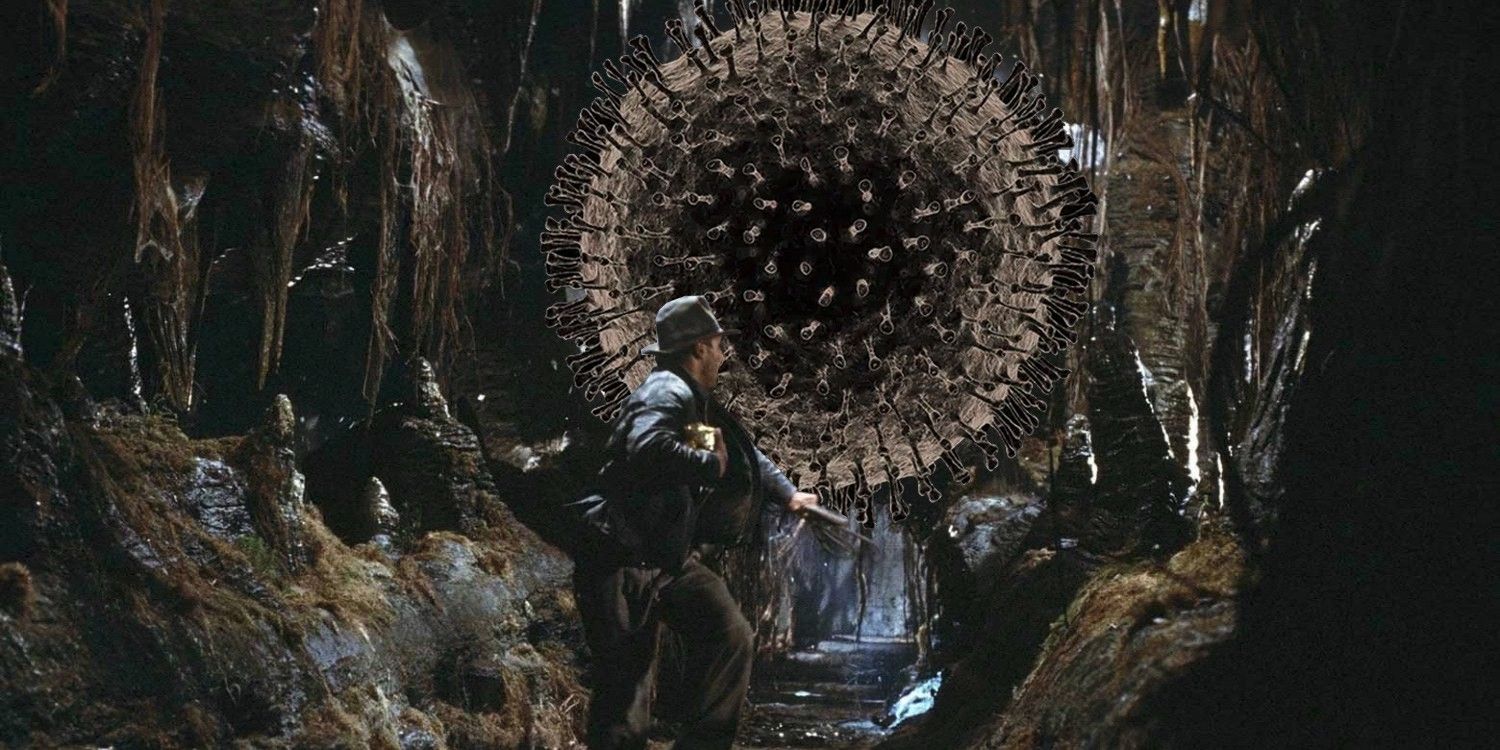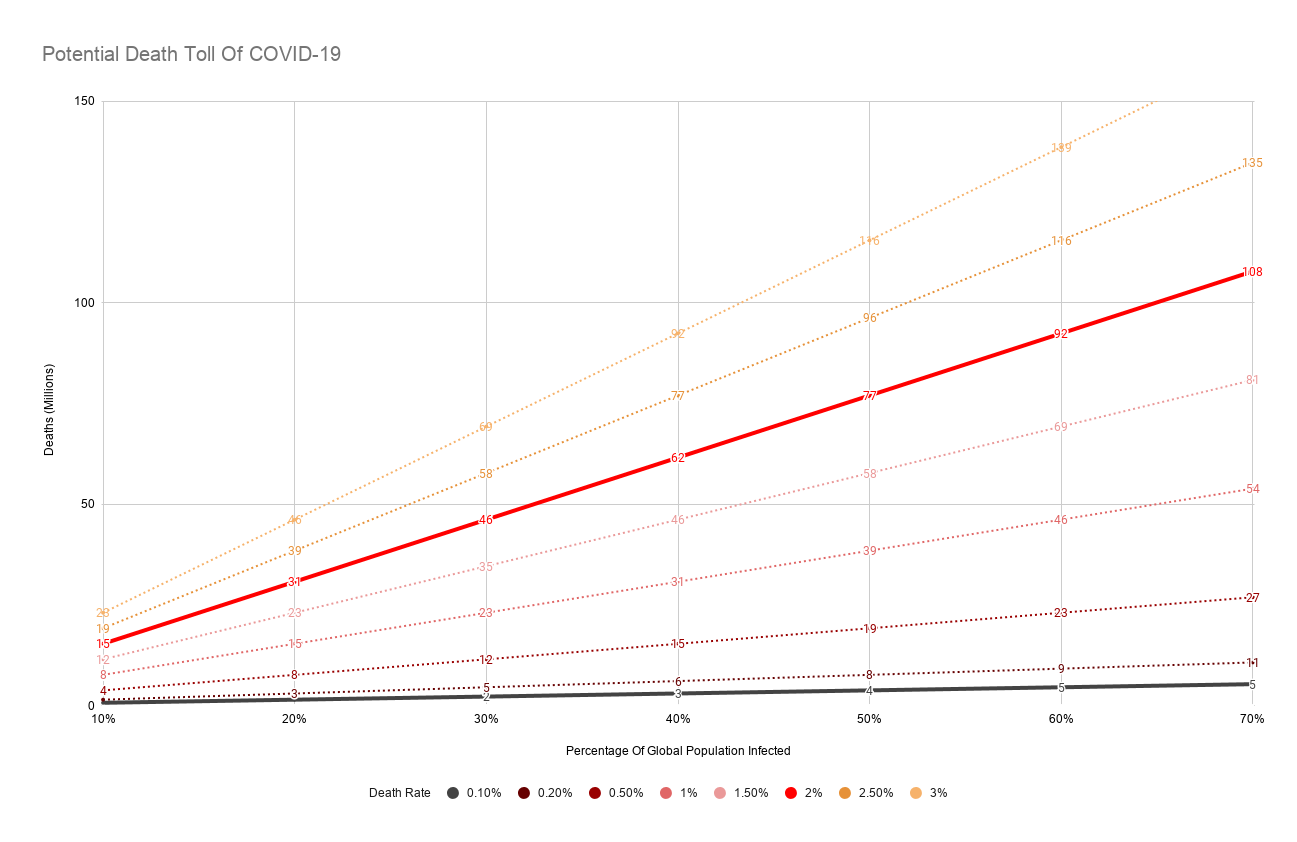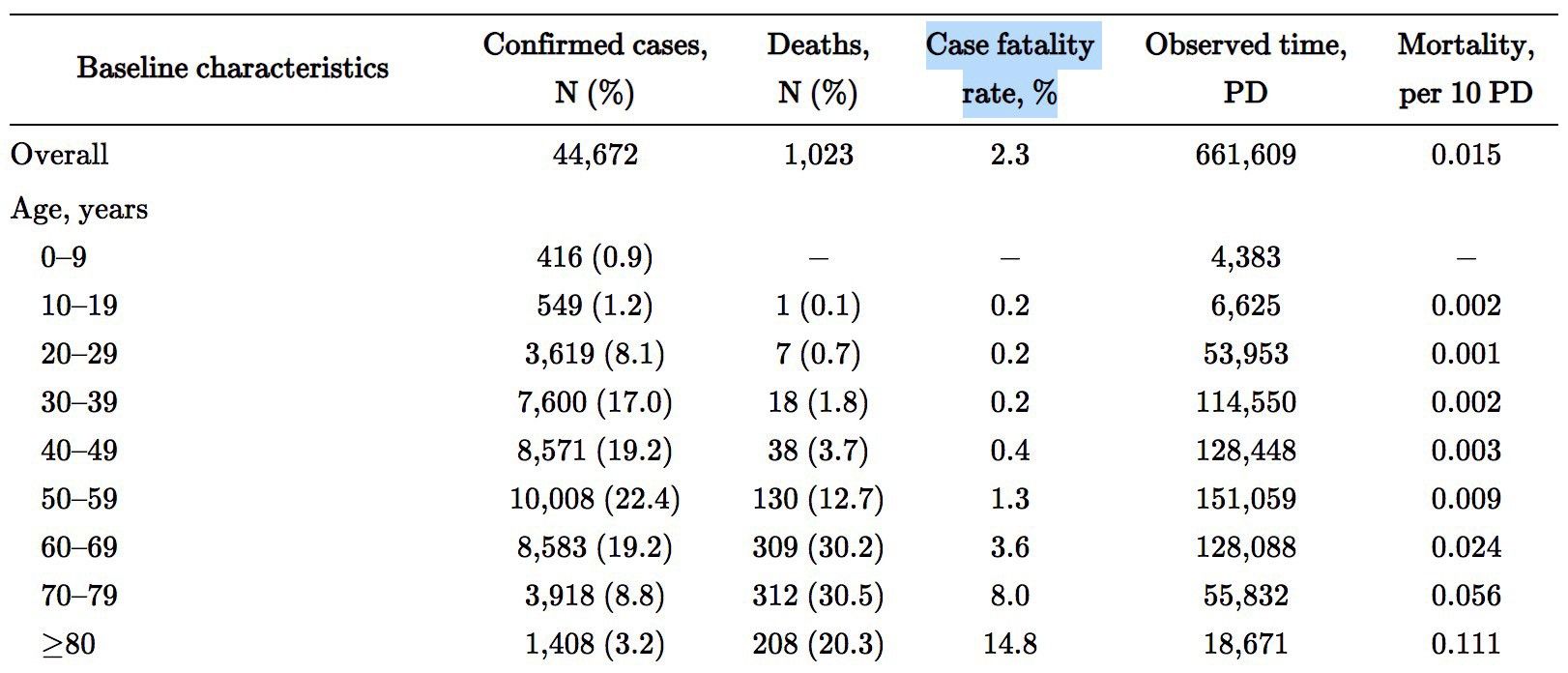Why We’re Not Overreacting To Coronavirus
This is the big one

I frequently hear that coronavirus isn’t that serious, that people are overreacting. Usually from old people that are the most at risk. They’re wrong. As the head of the WHO says, ‘this is not a drill’. This is the big one. We are not overreacting to COVID-19. In fact, most people are dangerously underprepared.
But it’s not that deadly

This is the problem. COVID-19 is in the goldilocks zone for viruses. Ebola can kill 50% of infected people, which sounds super scary, but also makes it a weak virus. A virus that kills half its hosts doesn’t get very far.
COVID-19 is in the goldilocks zone for viruses because it’s not that deadly, not that benign. The current estimated death rate is 3.4%. The number should go down as more testing happens. Let’s say it’s between 1–3%. This doesn’t seem that bad.
Unless you multiply it by billions.
According to experts, anywhere from 40–70% of the world may get COVID-19. Hence you’re multiplying by billions of cases, cases which have spread precisely because the virus isn’t that deadly. In the worst case, we’re talking about hundreds of millions of deaths. Already we are looking at likely millions. That already seems to be locked in. So yes, it’s likely not that deadly to you. That’s what makes it so deadly for us.
But we’re not counting that many cases

Again, that’s the problem. In the US, the President harps on about only having 100 cases, but they only did 500 tests before they started censoring that number. Now we don’t even know how much they’re testing. The US doesn’t know what it doesn’t know, and is calling that a success. It’s not.
Not testing is the medical equivalent of burying your head in the sand which, to a virus, is just dinner.
The US counts are almost certainly low by a factor of 10. Or more. We don’t know because they’re not even looking. The only countries doing testing at the scale required (10,000+ a day) are Korea and China, which, surprise, show the most cases. But that’s not necessarily because they have it worse, it’s because they’re testing.
To fight this thing takes a war-effort to test, isolate and trace contacts for every possible infected person. In that way, counting more cases is a good thing, because it means you’re doing something. A low case count just means you’re not counting.
But it won’t kill me
COVID-19 is not Ebola or even SARS. If you’re young and in good health, COVID-19 is probably not going to kill you. Mercifully, it seems to completely spare children. But it does kill. You presumably know and care about other people, so this should matter to you. Your grandparents for example.

According to a large study from the China CDC, the mortality rates for people 50 and above are quite high — going from 1.3% to 14.8% if you’re over 80. For reference, the seasonal flu kills about 0.1%. That means this disease is 150x worse for grandma than the flu. That’s bad.
COVID-19 is also especially deadly to medical workers who are just exposed to more of it. It’s deadly to people that are already sick or immunocompromised. It’s deadly to the poor, people without insurance (America, WTF), people living on the street, or in jail, or in refugee camps.
Like any predator, COVID-19 preys on the old, the weak and the marginalized. Or as we call them, our family, friends and fellow human beings.
If you’re privileged enough, COVID-19 likely won’t kill you. But it will kill.
But we can treat it
Yes, we can treat COVID-19 and save a lot of lives. Severe cases end up in ICU and the oxygen and assisted breathing help. However, how many ICU beds do you think we have? By one estimate, the UK will need 10x more ICU beds, and these are wards that are already running at 90% capacity. Most hospitals are running at capacity, nobody in the world has 10x capacity just waiting around. An epidemic like this will knock even advanced health systems out.
Of special worry is medical workers getting sick. If a doctor or nurse gets sick that’s not just another patient, it’s one less person to help other patients. If medical workers get infected that’s not just a sick person, it’s a sick hospital.
At the same time, there are also other people that need the hospital. Car accidents, dialysis patients, cancer patients, people with the flu. They may also need the ICU and medical attention. What happens to them?
In this way, a ‘treatable’ virus can — at scale — make it harder to treat anything. So COVID-19 can start causing unrelated deaths, simply because it doesn’t just infect human beings, it infects hospitals entire.
But panicking doesn’t help
This is true. But I’m not talking about panicking. I’m talking about a clear-eyed look at what’s in front of us and taking a war-footing to fight it. Like climate change, scientists are telling us very clearly about a threat and telling us very clearly that time is of the essence. They’re not telling us to panic, they’re telling us to act.
In China, after a fateful month of cover-up, they finally woke up and went all out to fight the disease. As an authoritarian regime, they were hostile to key early warnings, but once they understood they acted quickly and decisively, and now cases are going down.
Whatever China did at least brought the world a precious month to prepare. But the world is not prepared. At all.
The US, for example, lacks protective gear for nurses, testing equipment, and of course public health care and paid sick leave. The Trump administration systematically dismantled the pandemic chain of command and now it’s bureaucratic chaos.
Places like Iran are under sanctions and dysfunctional in the first place and they’re getting hammered.
The fact is that by the time you realize you need to prepare, it’s too late. This is like studying for a school exam really. When you cram the night before you really really wish you’d paced it out, but by then it’s too late. The exam comes and you can fail it. Only we can’t fail this. This is life.
None of this is a call to panic. Don’t stockpile useless face masks or toilet paper (seriously, just wash your butts), but get informed and collectively demand the right actions from your governments. We all need to give the greatest support to our weak medical systems and societally get on a war-footing to fight this thing. If your reaction to this is ‘meh’, then you’re not calm and cool. You’re just ignorant and you’re in the way.
What is the right reaction?
You should be worried. Perhaps not for yourself, but for other people, and our societies. You shouldn’t be worried about the stock market or your vacation plans, but on what those things all depend on. Public health.
For decades scientists have been saying that the next pandemic isn’t a matter of if, it’s when. This is when. Those same scientists have a pretty clear sense of what we need to do. We need to support the medical system, test widely, isolate cases and trace all contacts. Practically, this requires a war effort against the virus. This is all known, but the WHO is still going around, hat in hand, asking people to wake up.
“This is not a drill. This is not the time to give up. This is not a time for excuses. This is a time for pulling out all the stops. Countries have been planning for scenarios like this for decades. Now is the time to act on those plans,” Tedros said. “This epidemic can be pushed back, but only with a collective, coordinated and comprehensive approach that engages the entire machinery of government.”
That doesn’t sound like an overreaction, it’s just a lot of action.
This is it. This is the big one, the pandemic scientists have been warning about for years. The fact is that COVID-19 is a boulder coming at us, Indiana Jones style. The minute you hear twigs cracking you should run, because each second makes the boulder that much closer. If you’re still hemming and hawing at this point, you’re just wasting precious time.